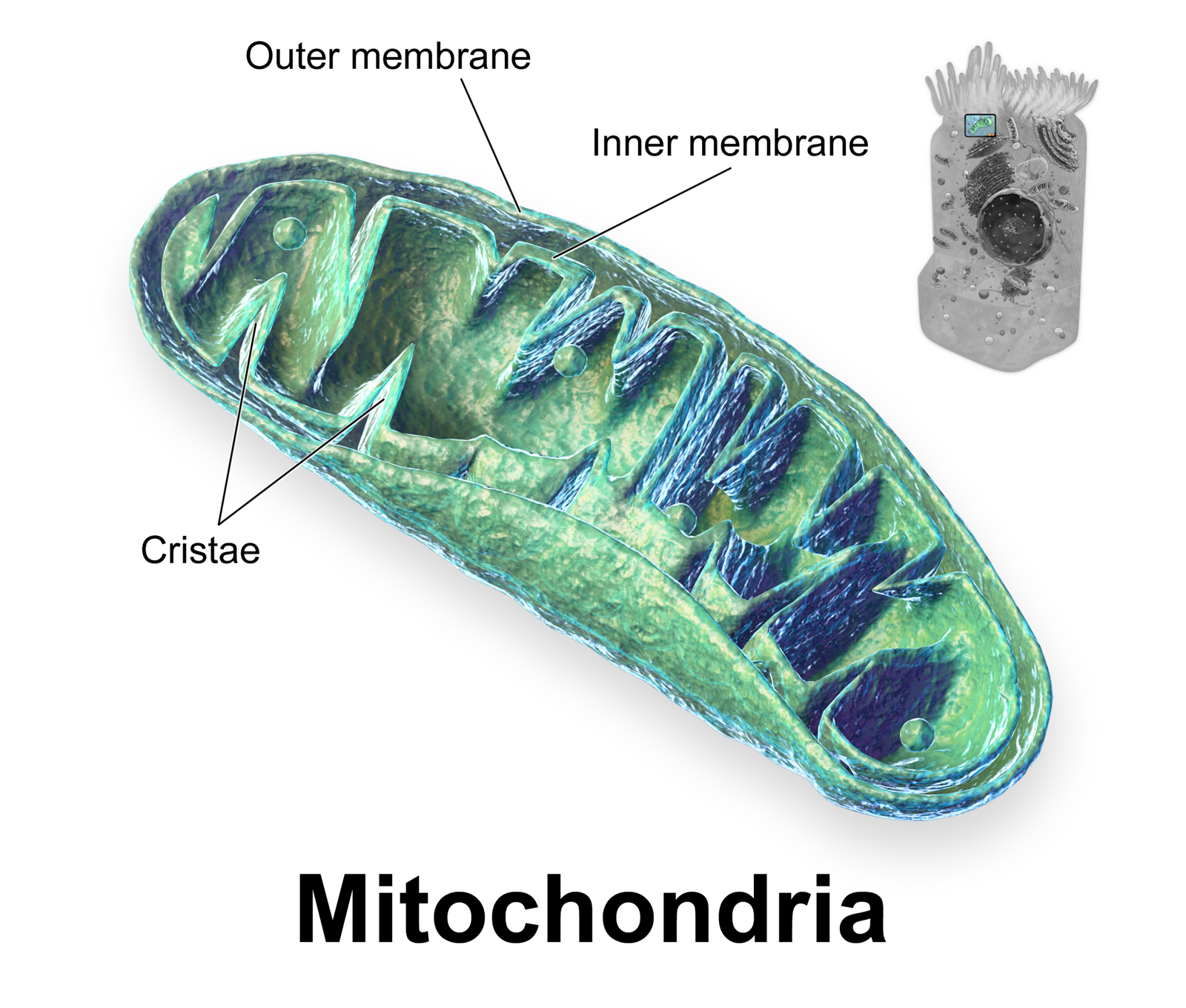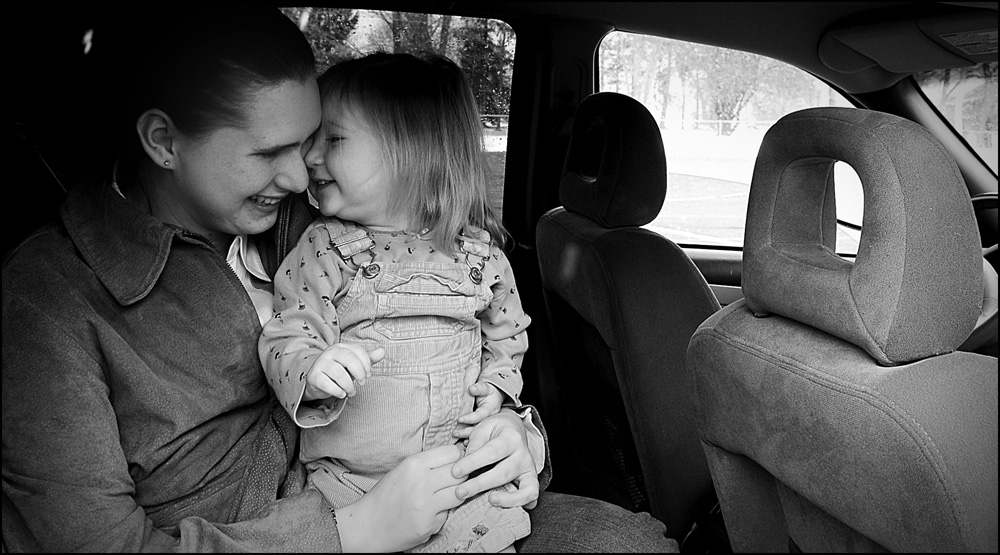Cellular Anatomy
 A mitochondrion (plural mitochondria) is a cellular organelle responsible for cellular respiration. Organelles are like the "organs" of cells (although they carry less inherent information).
A mitochondrion (plural mitochondria) is a cellular organelle responsible for cellular respiration. Organelles are like the "organs" of cells (although they carry less inherent information).
Mitochondria are unique among organelles in that they carry a little bit of unique DNA encoding several key metabolic proteins not coded in the human genome. This may be because mitochondria were, in the distant evolutionary past, symbiotic organisms. These organisms lived inside other unicellular, then multicellular organisms, and eventually lost their independence. This DNA is human because the mitochondria are now parts of human cells, not independent organisms. However, this DNA is technically called "extragenomic."
Moral Teaching: Organelle Donation
 There are no other examples of organelle donation apart from cloning (nuclear transfer to an egg before the egg is used in IVF). Cloning is directly addressed in Donum Vitae:
There are no other examples of organelle donation apart from cloning (nuclear transfer to an egg before the egg is used in IVF). Cloning is directly addressed in Donum Vitae:
But look closely at what Pope St. John Paul II says: "Procedures designed to influence the genetic inheritance of a child, which are not therapeutic, are morally wrong." (Emphasis mine.) This explicitly excludes mitochondrial transfer.
Mention is made of cystic fibrosis, which could be corrected cellularly at the early level by extragenomic gene therapy. The only difference between this and treatment of mitochondrial diseases is that the extragenomic DNA in genetic therapy for CF is carried by bacteria, while the extragenomic DNA in genetic therapy for mitochondrial diseases is carried by human organelles. (Makes mitochondrial transfer look downright natural and convenient, doesn't it?)
But this is not just about cells and molecules. It's about gametes and parenting, and that is why most people get antsy--because mitochondrial donors have been called third biological parents.
Moral Teaching: Parents
What is a parent? I'm not planning to hammer out a definition of "parent" today, especially since Catholic Encyclopedia can't. This is a dialectical argument to show you that parenting has to do with raising children, especially with the reproductive capacity at the beginning of the child's life.
Any definition of "parent" should be wide enough to include the following people:
 Notice that biological parenthood, simply speaking, is all it takes for us to call someone a mother or father. However, this is based on reproductive tissue (gametes), not DNA. Gametes may have too many or too few chromosomes; chromosomes may have repeats, deletions, or nonsense mutations; eggs may carry many or fewer mitochondria; mitochondria may carry defective extragenomic DNA.
Notice that biological parenthood, simply speaking, is all it takes for us to call someone a mother or father. However, this is based on reproductive tissue (gametes), not DNA. Gametes may have too many or too few chromosomes; chromosomes may have repeats, deletions, or nonsense mutations; eggs may carry many or fewer mitochondria; mitochondria may carry defective extragenomic DNA.
Key point: contribution to the DNA content of the zygote (which determines congenital disorders) does not matter as much as contribution of reproductive tissue. So what about this person:
Moral Teaching: Organelle Donation
Procedures designed to influence the genetic inheritance of a child, which are not therapeutic, are morally wrong. To try to correct a genetic disorder, such as cystic fibrosis, is morally permissible, whereas to manipulate the genetic structure to produce human beings selected by sex or some other quality is wrong. Attempts to produce a "breed" of humans through cloning, twin fission, or parthenogenesis outside the context of marriage or parenthood is immoral. These manipulations violate the personal dignity of the human being and attack his integrity and identity.(Emphasis mine.) From this quote, it might at first seem that the intention of producing a breed is the evil to be avoided, but the last sentence makes it pretty unavoidable: cloning violates human dignity.
But look closely at what Pope St. John Paul II says: "Procedures designed to influence the genetic inheritance of a child, which are not therapeutic, are morally wrong." (Emphasis mine.) This explicitly excludes mitochondrial transfer.
Mention is made of cystic fibrosis, which could be corrected cellularly at the early level by extragenomic gene therapy. The only difference between this and treatment of mitochondrial diseases is that the extragenomic DNA in genetic therapy for CF is carried by bacteria, while the extragenomic DNA in genetic therapy for mitochondrial diseases is carried by human organelles. (Makes mitochondrial transfer look downright natural and convenient, doesn't it?)
But this is not just about cells and molecules. It's about gametes and parenting, and that is why most people get antsy--because mitochondrial donors have been called third biological parents.
Moral Teaching: Parents
What is a parent? I'm not planning to hammer out a definition of "parent" today, especially since Catholic Encyclopedia can't. This is a dialectical argument to show you that parenting has to do with raising children, especially with the reproductive capacity at the beginning of the child's life.
Any definition of "parent" should be wide enough to include the following people:
- a woman who, with her own egg, conceives a zygote in her own uterus (biological parenthood, simply speaking)
- a man who, with his own sperm and body, fertilizes a woman who conceives a zygote in her own uterus (biological parenthood, simply speaking; this spectrum includes everything from rape to monogamous marriage)
- a person who raises a child conceived by other persons as his or her own (technically modified by the word "adoptive" or "foster," as in scripture of St. Joseph)
 Notice that biological parenthood, simply speaking, is all it takes for us to call someone a mother or father. However, this is based on reproductive tissue (gametes), not DNA. Gametes may have too many or too few chromosomes; chromosomes may have repeats, deletions, or nonsense mutations; eggs may carry many or fewer mitochondria; mitochondria may carry defective extragenomic DNA.
Notice that biological parenthood, simply speaking, is all it takes for us to call someone a mother or father. However, this is based on reproductive tissue (gametes), not DNA. Gametes may have too many or too few chromosomes; chromosomes may have repeats, deletions, or nonsense mutations; eggs may carry many or fewer mitochondria; mitochondria may carry defective extragenomic DNA.Key point: contribution to the DNA content of the zygote (which determines congenital disorders) does not matter as much as contribution of reproductive tissue. So what about this person:
- a person who gives his or her own DNA-containing mitochondria for transplant into to a woman's egg before the woman's egg is used in IVF?
- a person who gives his or her own undifferentiated white blood cells to a hematology/oncology patient (bone marrow donor)
- a person who gives his or her own red blood cells, platelets, or plasma to another person (blood donor)
- a person who posthumously gives his or her own ocular tissue to another person (cornea donor)
- a person who, living or posthumously, gives part of his or her own body to another person (organ donor)
In short, the person who gives their mitochondria for transfer is not violating human dignity. He or she saves the life of children conceived with mitochondrial disease, but he or she is an organelle donor, not a parent.
 |
| Ghost Heart (Decellularized) Src: TED. |
- But no other organ donation includes non-genomic DNA.
False. Every donation that includes mitochondria includes non-genomic DNA. This is everything but decellularized organs, plasma, platelets, and stool. - Okay, so no other organ donation includes only non-genomic DNA.
True. But there are other organ donations that are exclusively for the purpose of transferring DNA and hoping to replace the recipient's phenotype with the donor's. The best example is bone marrow transplants. - But mitochondrial transfer still requires IVF.
Very, very true. Although I hold that mitochondrial transfer per se is morally licit, I cannot condone current methods of mitochondrial transfer which involve IVF.
Hello from Dallas/UTSW! This blog is awesome. I learn so much every time I read this. Keep up the good work!!
ReplyDelete